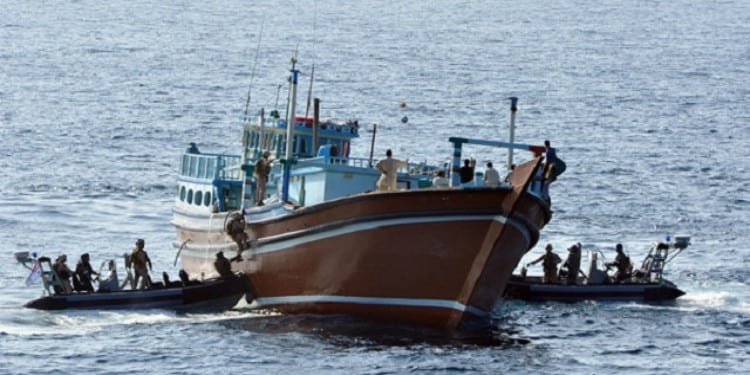What’s in today’s article?
- About the Anti-Maritime Piracy Bill 2019
Why in News?
- The Lok Sabha recently witnessed a rare display of unity between the government and opposition benches as the Anti-Maritime Piracy Bill 2019 was passed almost unanimously.
Background of the Anti-Maritime Piracy Bill 2019
- The 1982 UNCLOS defines piracy to include any acts of violence, detention or destruction committed for private ends against persons or property on board a ship on the high seas or outside the jurisdiction of any state.
- Acts of piracy threaten maritime security by endangering the welfare of people travelling by sea and the security of navigation and commerce.
- As per the International Maritime Organisation, during 2018 and 2019, 84 acts of piracy were reported globally.
- Currently, India does not have a domestic legislation on maritime piracy and the Indian Penal Code, 1860 (IPC) pertaining to armed robbery and the admiralty jurisdiction of certain courts have been invoked to prosecute pirates.
- However, the sovereignty of India extends only up to the territorial waters of India (12 nautical miles from the coastline) and the piratical acts by a foreigner committed outside the territorial waters of India do not constitute an offence under the IPC.
- In 1995, India ratified the UNCLOS, which gives a uniform international legal framework for combating piracy and consequently the Anti-Maritime Piracy Bill, 2019 was introduced and has been referred to the Standing Committee on External Affairs.
Highlights of the Anti-Maritime Piracy Bill 2019:
Image Caption: Illustration of Exclusive Economic Zone
- It enables Indian authorities to take action against piracy in the high seas, beyond the Exclusive Economic Zone (EEZ), i.e., beyond 200 nautical miles from India’s coastline.
- It defines piracy as any illegal act of violence, detention or destruction against a ship, aircraft, person or property, for private purposes, by the crew or passengers of a private ship or aircraft.
- Piracy also includes inciting and intentionally facilitating such acts of violence, and voluntarily participating in the operation of a pirate ship or aircraft.
- Committing an act of piracy will be punishable with –
- Up to 14 years of imprisonment and a fine, for participating, organising, aiding, and directing others to participate in an act of piracy.
- Life imprisonment or death, if the act of piracy causes or seeks to cause death.
Key issues and analysis of the bill:
- A mandatory death penalty
- Under the Bill, if a person, while committing an act of piracy causes or seeks to cause death, he will be punished with death. This implies a mandatory death penalty for such offences.
- The Supreme Court has held that mandatory death penalty for any offence is unconstitutional as it violates Articles 14 and 21 of the Constitution.
- Overlapping circumstances
- The Bill provides for imprisonment of up to 14 years if a person participates in an act of piracy.
- Committing an act of piracy (which includes voluntarily participating in the operation of a pirate ship or aircraft) is punishable with life imprisonment.
- As these circumstances may overlap, it is unclear how the punishment would be determined in such cases.
Q1) What are high seas?
The high seas are defined by international law as all parts of the ocean that aren’t included in the exclusive economic zone, the territorial sea, or the internal waters of a country, or in the archipelagic waters of an archipelagic country.
Q2) What is the purpose of exclusive economic zone?
The concept of an EEZ was adopted through the 1982 UNCLOS. It gives sovereign rights for the purpose of exploring, exploiting, conserving, and managing natural resources of the seabed, subsoil, and waters above it. Jurisdiction as provided for in international law with regard to the establishment and use of artificial islands, installations, and structures; marine scientific research; and the protection and preservation of the marine environment.
Source: Explained | What is the Anti-Maritime Piracy Bill, 2019?
Last updated on June, 2025
→ UPSC Notification 2025 was released on 22nd January 2025.
→ UPSC Prelims Result 2025 is out now for the CSE held on 25 May 2025.
→ UPSC Prelims Question Paper 2025 and Unofficial Prelims Answer Key 2025 are available now.
→ UPSC Calendar 2026 is released on 15th May, 2025.
→ The UPSC Vacancy 2025 were released 1129, out of which 979 were for UPSC CSE and remaining 150 are for UPSC IFoS.
→ UPSC Mains 2025 will be conducted on 22nd August 2025.
→ UPSC Prelims 2026 will be conducted on 24th May, 2026 & UPSC Mains 2026 will be conducted on 21st August 2026.
→ The UPSC Selection Process is of 3 stages-Prelims, Mains and Interview.
→ UPSC Result 2024 is released with latest UPSC Marksheet 2024. Check Now!
→ UPSC Toppers List 2024 is released now. Shakti Dubey is UPSC AIR 1 2024 Topper.
→ Also check Best IAS Coaching in Delhi













